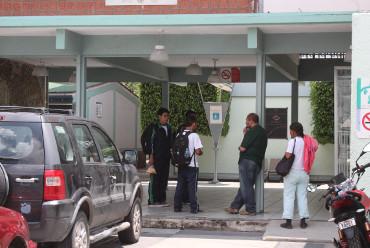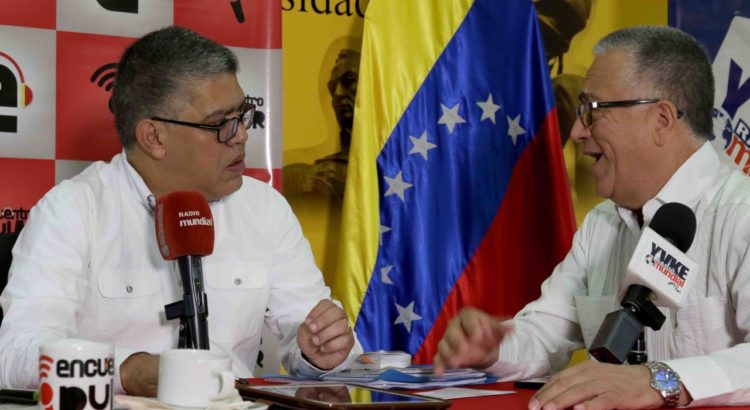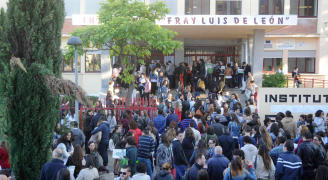América del Norte/Estados Unidos/09 de Septiembre de 2016/Autor: Steven W. Thrasher/Fuente: The Guardian
RESUMEN: Volver a la escuela en Estados Unidos esta semana, por lo general significa una cosa en los campus universitarios: es hora de que las administraciones universitarias atornillen a sus profesores y a sus estudiantes de todo el dinero posible. En el campus de Brooklyn de la Universidad de Long Island, la universidad negoció con sus profesores un nuevo contrato, la administración ha bloqueado a sus 400 profesores sindicalizados que les impide acceder a sus cuentas de correo electrónico, e inmediatamente cortando los beneficios de la salud de los trabajadores, sus socios – e incluso a sus hijos. Un bloqueo preventivo es un movimiento extremo en cualquier conflicto laboral. Los profesores creen que es la primera vez en la historia de la educación superior estadounidense que se ha producido un bloqueo.
It’s back to school across the United States this week, and that usually means one thing on college campuses: it’s time for university administrations to screw their faculty and their students out of much money as possible.
At Long Island University’s Brooklyn campus, as the university negotiated with its faculty over a new contract, the administration locked its 400 unionized professors out – barring them from campus, blocking them from accessing their email accounts, and immediately cutting off healthcare for the workers, their partners – and even their children.
A pre-emptive lockout is an extreme move in any labor dispute, one typically associated with robber barons keeping coalminers out of shafts while bringing in scab labor. Faculty members believe it the first time in the history of US higher education that a lockout has occurred.
LIU did not respond to multiple requests for comment from me, but university counsel told the New York Times that the university had locked out their faculty because “the last five out of six contracts, the faculty has gone on strike, and they have created chaos and virtually shut down the institution at the start of classes”. In a statement, LIU wrote that its “Brooklyn faculty and adjuncts are well compensated when compared to peers at other institutions within the tri-state area and nationally,” with benefits which “exceed industry standards”.
But if LIU wanted to trim costs, it might start with the salary of its president, Kimberly Cline, who was paid $476,232 in 2013, the most recent year for which public records are available. And the timing of a lockout is strange, considering it happened on 1 September – and the union wasn’t scheduled to vote on the proposed contract until 6 September.
As Stuart Fishelson, professor of media arts, points out, “We didn’t vote to strike – it was a strike authorization! We were prepared to work while we continued negotiating in good faith.”
Meanwhile, as the Nation also reported, Fishelson says that LIU had been planning to have administrators and freelancers teach classes that they might not have any qualifications to teach. “They hired faculty from monster.com, and none of the temporary faculty have been reviewed by the proper process – which means the university could lose its accreditation if there is an audit,” he claims.
Advertisement
Syed Ali, a professor of sociology at LIU (and an academic colleague of mine), told me he knew something was up in July when someone updated his Blackboard teaching software account. He forwarded an email he’d sent to administration which read: “Why are there syllabi in my courses in Blackboard and who put them there? They are four years old and not applicable anymore. And why does someone else have access to my account?” (He had forwarded that email to his external account at the time, and since he can’t get into his LIU email, he doesn’t remember the response.)
For LIU to hire scab instructors is pretty galling, especially considering its tuition is more than $34K. But while LIU’s actions may seem extreme, they are quite in line with the trend for American universities to charge a fortune in tuition – increasing faster than inflation – while also trying as hard as possible not to pay much of that to the instructors who provide the actual education. As a doctoral student myself, I often get emails soliciting instructors in the New York area, no cheap region to live. Recently, I saw a call seeking a PhD with two additional years of teaching experience to teach an introductory American Studies course to 25 students … for the grand sum of $2,775. This is all they are paying, when tuition is 41K and total direct costs to students are about 61K a year.
Where does all of this money go, if not to professors?
“For more than two decades, higher education has seen a clear pattern of income transfer to the top,” my colleague Andrew Ross, a professor of social and cultural analysis at New York University and the president of the New York chapter of the American Association of University Professors, explained to me. “As the salaries of full-time faculty stagnate or are converted into near-poverty wages for adjuncts, pay for administrators has skyrocketed.”
Fishelson, the LIU professor, says the lockout is also “part of a plan to corporatize the university”, tying into the aim of “have business people coming in to teach the classes”, akin to “what’s going on with charter schools across the country. It’s very dangerous.”
And while LIU is a private university, tuition is rising even faster at public universities. Regardless of how LIU resolves its labor standoff, some major aspects of American higher education – decreasing government support, the student loan industrial complex, real estate speculation, and administrative bloat – will remain.
And each September, when we send in a generation of smart youngsters to perpetuate these problems by indebting themselves before they’ve even joined the workforce, we are making the problem worse.
Fuente: https://www.theguardian.com/commentisfree/2016/sep/08/long-island-university-lockout-faculty-education













 Users Today : 85
Users Today : 85 Total Users : 35459991
Total Users : 35459991 Views Today : 115
Views Today : 115 Total views : 3418580
Total views : 3418580